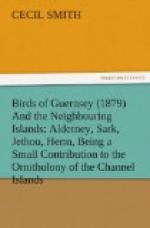23. SONG THRUSH. Turdus musicus, Linnaeus. French, “Grive,” “Merle Grive.”—Very common and resident in all the Islands, and great is the destruction of snails by Thrushes and Blackbirds—in fact, nowhere have I seen such destruction as in the Channel Islands, especially in Guernsey and Herm, where every available stone seems made use of, and to considerable purpose, to judge from the number of snail-shells to be found about; and yet the gardeners complain quite as much of damage to their gardens, especially in the fruit season, by Blackbirds and Thrushes, as the English gardeners and seem equally unready to give these birds any credit for the immense destruction of snails, which, if left alone, would scarcely have left a green thing in the garden.
The local name of the Thrush is “Mauvis.” It is, of course, included in Professor Ansted’s list, but with the Fieldfare, Redwing, and Blackbird, marked as only occurring in Guernsey and Sark. All these birds, however, are equally common in Alderney, Herm, and Jethou. There is also a specimen of each in the Museum.
24. REDWING. Turdus iliacus, Linnaeus. French, “Grive mauvis,” “Merle mauvis.”—A regular and numerous winter visitant to all the Islands, arriving about the end of October, and those that are not shot and brought into the market departing again in March and April.
25. FIELDFARE. Turdus pilaris, Linnaeus. French, “Grive litorne,” “Merle litorne.”—Like the Redwing, the Fieldfare is a regular and numerous winter visitant, and arrives and departs about the same time.
When in Guernsey in November, 1871, I did not see either Redwings or Fieldfares till a few days after my arrival on the 1st; after that both species were numerous, and a few days later plenty of them might be seen hanging up in the market with the Thrushes and Blackbirds, but for the first few days there were none to be seen there. Probably this was rather a late year, as neither bird could have arrived in any numbers till the first week in November, and in all probability not till towards the end of the week.
26. BLACKBIRD. Turdus merula, Linnaeus. French, “Merle noir.”—– The Blackbird is a common and numerous resident in all the Islands in the Bailiwick of Guernsey. The Guernsey gardeners, like their brethren in England, make a great fuss about the mischief done by Blackbirds in the gardens, and no doubt Blackbirds, like the Golden Orioles, are “grand gobeurs” of many kinds of fruit; but the gardeners should remember that they are equally “grand gobeurs” of many kinds of insects as well, many of the most mischievous insects to the garden, including wasps (I have myself several times found wasps in the stomach of the blackbird) forming a considerable portion of their food, the young also being almost entirely fed upon worms, caterpillars, and grubs; and when we remember that it is only for a short time of the year that the Blackbird can feed on fruit, which in most cases can be protected by a little care, and that during the whole of the other portion of the year it feeds on insects which would do more damage in the garden than itself, it will be apparent that the gardener has really no substantial ground of complaint.




